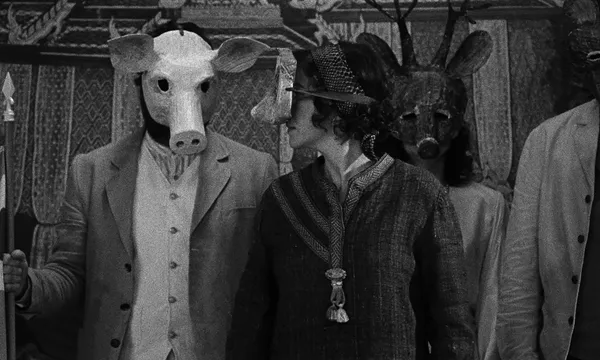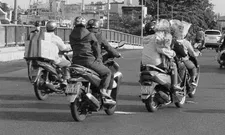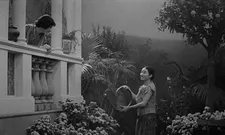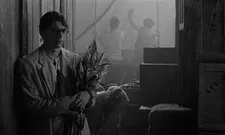 |
| Grand Tour |
Portugeuse director Miguel Gomes' The Grand Tour transports us back to colonial Burma in 1917, where jilted bride Molly (Crista Alfaiate) sets off across the Asian continent in pursuit off her fiancée Edward (Gonçalo Waddington), a British civil servant.
Gomes has established himself as a singular voice in world cinema. From his Portugeuese mountain-set drama, Our Beloved Month Of August (2008), to Tabu's (2012) character's search at the foothills of Mount Tabu in Africa, and the Arabian Nights trilogy (2015), Gomes has geographically shifted the focus of his stories. He continues to redirect his authorial traits not only through the setting of Asia but by bringing together the screwball comedy with the aesthetically striking monochrome cinematography of The Grand Tour's period chapters, and a documentary style for the present day.
 |
| Grand Tour |
In conversation with Eye For Film, Gomes discussed his transformation as a storyteller, the relationship between cinema and literature, and using music to express the emotion and humanity.
Paul Risker: This far into your career, how do you view yourself as a storyteller, and from your first film to The Grand Tour, have you evolved as a filmmaker?
Miguel Gomes: That's a good question. All the good questions have complicated answers, so, I'll try my best. I’ve been making feature films for more than 20 years. I guess something has changed in the process, and I’m not in the same place, which I hope is natural.
It's true that from the beginning, my interest in cinema was not only about telling a story. It's part of what you do, but it's only something that adds to the other aspects. When you're showing a film, you share with the audience shots and scenes, characters, places, and music that become the kind of universe you visit, that you want to be inside.
In the case of my films, they have their own rules, and so telling the story is a part of this totality. But it's only one part. I was always interested in showing the audience how a story is created before their very eyes. It's an interest that has developed in a natural way which I don't rationally know how to put into words. I guess it has changed, but it was always the same idea of sharing with the viewer how stories are built, how they feed themselves and how they develop and take shape.
PR: World building is not only physical, but emotional. We can't talk about this film or your filmography without considering the emotional side of the storytelling. The relationship between cinema and emotion is a fascinating and integral one.
 |
| Grand Tour |
MG: Cinema is always an encounter between the film and the inner sensibility and universe of the viewer. Everyone reacts to different things, and that’s a good thing. There are some people that would be pleased if everyone reacted the same way to the same stimulus, and thank God it doesn't work like that. So, I try to have the emotions the characters are feeling and living go further, because, for instance, the element that concentrates emotion is music.
Music has always given us access to emotions in an abstract way. And it doesn't have to do with the lyrics nor the rational construction. It's very sensorial, and you just feel the emotions, which are not communicated through your rational system.
Both the world of the characters and the emotions they are feeling, interacts with this type of sensitive climb the film has, that almost lends it its own atmosphere. It can get colder or warmer, melancholic or euphoric — it depends, but it's moving. I cannot project humanity in a general way by thinking 'Okay, people here will be sad.’ Some of them will be sad, but not everyone, and as I said, that's a good thing.
PR: What was the genesis of the idea for The Grand Tour?
MG: It was Somerset Maugham’s travelogue, A Gentleman In The Parlour. In a few pages, Maugham describes his encounter with an English man, who explains what happened to him before his marriage. It was only two or three pages, so it was only like the itinerary, and a joke about men and women.
In the book, Maugham says, this man got married by the Council of Chengdu in China. He notes the year, and we checked, but there's no record of this ever happening. We imagine it was only something that came from a joke or something else, and Maugham told it like it was a fact, when it wasn't.
 |
| Grand Tour |
My screenwriters and I asked whether we could do both things? Could we do a travelogue, with the exact same itinerary as told in the book, with these two characters, and at the same time tell all of these stories? But we can't do a travelogue from 100 years ago; we could only do it in the present. So, what about a mix of travelogue in the present with this story set in a studio in 1918? This was our departure point.
PR: If cinema is the youngest art form and is an amalgamation of all the others, does cinema owe a debt to literature?
MG: I always have the impression that, for instance, when you see the favourite films of very good novelists, they have lousy taste. Not everyone, but it means that you can be a great writer, but cinema is something different, even if it shares something with literature.
I'm very fond of literature and I read a lot as a teenager. These books are a part of me; they're a part of my memories, as is cinema. In life, it's all mixed together, and I don't have any problem with the fact that cinema, for instance, doesn't look very naturalistic. Cinema is not life; it’s something that helps you to connect with life and see how we live, but it must look different. This idea of being immersed inside reality or a thing that pretends to pass itself off as reality doesn't work for me.
Nowadays, literature is often disassociated with, let's say, the most popular forms of cinema. Some adaptations take out all the aspects that make a book great, which are how it's written, how it articulates itself, and how it develops in a literary way. Cinema tends to kill all of these things.
I like to take aspects of certain art forms, like music, literature, and even painting, and present them in a very materialistic way — but not to hide or dissolve it. I want the power of literature inside the film, for example, which means the characters will sometimes speak like they would in the book, or the voice-over cannot be too colloquial, as if someone were speaking in daily life. […] I can steal easily and joyfully from other art forms and try to capture some of their beauty.
 |
| Grand Tour |
PR: The Grand Tour is a mix of styles, and it's transforming throughout. Instead of feeling formulaic or clichéd, it has room to grow and play, and so the film feels as if it is alive. From this point of view, you are challenging the cinematic language.
MG: One of the things that really works in cinema, that is very important to me, is how you make transitions. This change in the film can exist on many levels, but for me, this is the movement of a film.
Sometimes with arthouse cinema, people complain that the film doesn't move because of two long shots and other such things. I don’t feel this way because these changes, these transitions are the movement of a film, even if you have long shots. You can have many, many shots, and the film still doesn't move at all.
I'm not complaining about the lack of movement in blockbuster films. Even in art house cinema, sometimes, from the beginning to the end of the film, it can be the same thing throughout. It’s like you're playing the same note all the time, and that note can be great, but for me, it's important that the film can change during the process. And so, I cannot imagine a film that does not do this. What you're talking about is a very crucial issue for me.
The Grand Tour is released theatrically by Mubi in the UK and Ireland on April 18th, and opened in select US cinemas on March 28th.
























